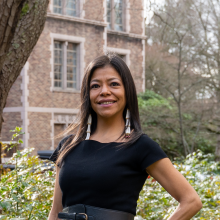
BA in Education, Communities and Organizations
Autumn 2026 Admissions
Accepting ECO applications from March 1 through April 15.
Schedule a prospective student appointment to learn more about the major!
While ECO is a capacity-constrained major, our acceptance rate is 95%.
What you can earn
Duration
Credits earned
Format
Time commitment
Upcoming deadline
Learning in and learning through community
The Education, Communities and Organizations (ECO) major believes learning happens anywhere and everywhere— both in and beyond classroom settings. The curriculum in the ECO major prepares students to use content knowledge and skills in human development, equity studies, learning across contexts, and organizational change to address goals and priorities of targeted communities and organizations led by and serving folks who are systemically oppressed. The ECO major prepares students to meet the teaching and learning needs of communities in equitable ways while maintaining an active commitment to collective liberation. ECO believes that teaching and learning can be found in every community and profession: from classroom teaching to grassroots organizing, youth development, policy advocacy, research, communications, health care, and beyond.
The ECO major also engages students in a 3-4 quarter long internship and take a 3 quarter long capstone seminar their final year prior to graduation/degree completion. ECO Internship Program works to build mutually beneficial relationships with community partners to further organizational goals, address community- identified issues, and promote student learning. ECO students work with a community-based organization to increase capacity while also further developing professional knowledge and skills for collective liberation. Both students and internship hosts/mentors are supported by a dedicated team of faculty and staff who offer wrap-around support by facilitating communication, fostering synergy, and centering reciprocity in the relationship.
Curriculum
Overview
The ECO major is composed of three complementary curricular components:
- 26 credits of core courses: Study learning theory, human development, equity studies, organizational theory and community-based research and practice
- 25 credits of elective courses: Explore diverse areas of study from teaching and learning to equity studies to dual language learners to coaching
- 15 credit capstone internship and seminar: Apply your knowledge and practice your skills in a community-based organization
Courses
- Introduction course (3 credits)
EDUC 280 - Introduction to Education, Communities and Organizations
An introduction to the ECO program and major content areas: learning theory, human development, educational organizational theory, community-based methods, ecological theory and asset-based community development. Students also explore the multitude of careers that utilize the skills of teaching and learning. What is "education" and how can we support equitable teaching and learning in communities?- Core courses (26 credits)
EDUC 370 - Learning Within and Across Settings (5)
Observe and evaluate the plethora of ways learning happens and how it is experienced across a variety of formal and informal learning environments, from classrooms to health clinics. How is the dynamic and interdisciplinary process of learning and teaching connected across settings and people?EDUC 251 - Seeking Educational Equity and Diversity (5)
Further your understanding of the challenges to establishing, educational equity and diversity. How does knowing ourselves facilitating understanding and working with others?EDPSY 302/404/380 - Human Development course (5)
Enroll in your choice of one human development class, each focusing on a different point in the life cycle: Childhood, adolescence, or adulthood. How can we adjust the tools of teaching to be developmentally appropriate for our audience?EDUC 472 - Individuals, Groups, Organizations and Institutions (5)
Understand the basic dynamics and processes of organizations, and how organizations interact with, and WITHIN, communities. How do organizations both facilitate and hinder change, especially toward social justice?EDUC 473 - Community-based Research and Practice (5)
Develop an understanding of the principles and practices required for effective and equitable community-based research and practice. How can we re-envision the way we work, research and learn WITH communities in order to be more equitable partners? Prerequisite: EDUC 251.EDUC 460 Education, Communities, and Organizations Capstone Internship Preparation (two-quarter long course, 1 credit total)
Prepares students to access and navigate the unique Education, Communities, and Organizations (ECO) major capstone internship placement process while building camaraderie as a cohort. Students reflect on their lived experiences in order to vision a meaningful and responsive community-engaged capstone internship experience.- Capstone internship courses (15 credits)
- EDUC 481 - Community - Based Capstone I (5)
- Prerequisite: EDUC 251, 370, 460, 472, and 473
- EDUC 482 - Community - Based Capstone II (5)
- Prerequisite: EDUC 481
- EDUC 483 - Community - Based Capstone III (5)
- Prerequisite: EDUC 482
By engaging in the priority projects of a community-based organization, you will apply your classroom knowledge to better understand the complexities of partnering with communities to meet their teaching and learning needs. Students intern for approximately 25 weeks, minimum 10 hours per week.
- EDUC 481 - Community - Based Capstone I (5)
- Elective courses (25 credits)
Students select electives based on individual learning goals. The ECO major requires 25 credits of elective courses. While the core courses help you develop skills and core competencies about working with communities and organizations, the elective courses allow you to gain a deeper set of skills and knowledge in focused areas.
- Many undergraduate courses in the College of Education may be used to satisfy the electives requirement
- UW students can refer to DARS for an updated list of approved electives.
- The department may approve a maximum of 5 credits to satisfy ECO elective requirements from
- Volunteer/service-learning/field experience coursework (e.g. Dream Project, Pipeline, Jumpstart, and GEN ST)
- Education-related study abroad credits
- Study abroad and field experience credits require departmental approval
- No more than 5 field experience and study abroad credits may be applied to ECO electives.
Fieldwork
Internship Placement
ECO Internship Program partners with over 50 community partners including local non-profits, Tier 1 and Tier 2 Seattle Public Schools, and a few UW service programs. Each cohort of ECO students will be prompted by the ECO Community Partner Liaison (internship coordinator) to fill out an interest survey the year before their internship begins. Students' responses to this survey inform recruiting efforts of additional community partners that align with students' interests.
Establishing an internship for ECO takes place in the EDUC 460 class which occurs the Winter and Spring quarters before students' final year in the ECO program. During EDUC 460's two-quarter long course (Winter & Spring), students are guided through the internship placement process. Students will receive support in building their application materials, meeting community partners, learning from current and past ECO interns, and interview practice.
Internship Year
- Internships begin between Summer and the start of Fall quarter of a student's final year in the ECO program. All internships conclude by Finals Week of Spring quarter.
- Students intern with a community-based organization or school for approximately 9-10 hours per week over the course of 3 to 4 consecutive quarters in their senior year for a total of 270-300 hours.
- The internship provides students the opportunity to engage in programming projects and/or direct service, while receiving mentorship from the community partner mentors.
- The community organization/school that students intern with centers collective liberation and serves communities who hold targeted identities and experience systemic oppression.
- The work of ECO Interns is intended to directly contribute towards the mission of the organization, as well as provide the student opportunities to apply newly learned skills in a supportive environment and bridge their social justice theories to action.
Completion
Once you've completed all core coursework, you will begin an internship that's spread across 3 quarters, for approximately 15 hrs/week. During this time you will also attend a weekly capstone seminar that supports your experience and builds your professional skills.
You will intern at one of our community partners which includes schools, government agencies and non-profit organizations that focus on:
- Youth development
- Advocacy
- Policy
- Community development
- Higher education
- Professional learning and development
- Health, environmental or art education
- Coaching
- and more!
Advising
College of Education - Prospective Students
Prospective students interested in learning more about admission requirements, scholarships, or transferring to UW, are encouraged to schedule an admission advising appointment with:
- Alejandra Baires-Ramirez, Lead Admission & Outreach Adviser
- Waleed Khan, Academic Adviser for Undergraduate Programs
- Ramon Concepcion, Assistant Director for Undergraduate Academic and Student Services
ECO Prospective and Current Students
All current and prospective ECO students who are ready to declare or learn more about the major are welcome to schedule an academic advising appointment with:
- Keeyon M. Scott, Lead Academic Adviser
- Declared ECO major students can also find drop-in and advising appointment scheduling information in the ECO Advising Center.
Admission requirements and process
Overview
The ECO major admits undergrad students for autumn and winter quarters. Applications must be submitted by 11:59 p.m. on the last day of the application period. Late applications are not accepted.
- Autumn quarter applications are accepted March 1 through April 15
- Winter quarter applications are accepted from September 1 through October 15
Program is open to all eligible persons regardless of race, sex or other identity.
Requirements
- 45 completed credits at UW
- Transfer credits are accepted but must be assessed by the UW Admissions office before applying
- Credits in progress are counted toward the required 45.
- 2.50 cumulative GPA (minimum)
- Completion of the following courses before beginning the major*:
- EDUC 280- Introduction to Education, Communities and Organizations
- 2.0 minimum grade
- English Composition
- 2.5 minimum grade
- EDUC 280- Introduction to Education, Communities and Organizations
*You may submit an application while enrolled in EDUC 280 and/or an English composition course. If all other criteria are met, you will be conditionally admitted pending final course grade.
Materials
Admission essay (all applicants):
Write a response to the following three essay prompts. Each response must be 250 words or less. All materials submitted must be written and edited by the applicant, only.
- Have you experienced, witnessed, or learned about injustices in your educational journey? Please describe. How will the ECO major help you understand these injustices?
- The ECO major requires a year-long internship working with a community partner. How do you think this community-based learning will enhance your educational experience?
- The ECO major helps to empower students and graduates to make positive changes in educational and community settings. What are some of the positive changes you would like to work towards in these settings?
Unofficial transcripts (transfer students only):
The application portal will require that you upload unofficial transcripts from previous or current colleges and universities. Transcripts sent to the UW admissions office are not a substitute for uploading unofficial transcripts.
Submitting
Current UW students
- Gather required materials
- Visit the online application form
- Complete all steps in application process and upload your materials
- Submit your application
Next Steps
Transferring
We welcome transfer students to our program! As a transfer student, you will have some additional steps and required materials to your application process.
If you are interested in the ECO major, be sure to select the major on your UW Admissions application. We require EDUC 280 to be completed for a student to be fully-admitted to the major. Transfer students who select the ECO major on their UW Admissions application will have a seat in EDUC 280 held for them.
Transfer students need to submit an unofficial transcript with their ECO application:
- Include transcripts from all institutions you have previously attended
- You must upload your transcript during the application process
- Do not mail your transcript when you apply
You will be submitting TWO applications: one to join the University of Washington and one to join the ECO program.
- Gather all required materials for UW admissions
- Gather all required materials for ECO.
- Connect with our Lead Admissions & Outreach Adviser to help you through the process
Feel confident in the process by attending Transfer Thursday, an informational event run by the UW Office of Admissions. We also invite you to attend one of our weekly undergraduate majors and minor information sessions.
After submitting your enrollment deposit to the university, admitted transfer students will attend the required Transfer Advising & Orientation hosted by UW First Year Programs. This is a chance for you to meet with an ECO adviser and create a plan to successfully complete the course and internship requirements.
Costs and funding
Estimated Costs
We are a tuition-based program. Estimated tuition rates are based on your residency:
- Estimated cost for Washington state residents: $12,643 per year
- Estimated cost for out-of-state students: $41,997 per year
Estimates are subject to change due and may differ due to course load and summer quarter enrollment. Estimates include some fees such as building fee, technology fee, U-Pass, etc. Fees such as textbooks are not included.
View the UW tuition dashboard →
Visit the Office of Planning & Budgeting →
Funding & Scholarships
It is highly recommended that students in the program complete the Federal Student Aid (FAFSA) or Washington Application for State Financial Aid (WASFA) application. These applications are necessary for various forms of financial aid, including scholarships and loans.
Frequently asked questions
- How do I know if I have 45 quarterly credits
We consider both in progress and completed credits. At the bottom of your current transcript you can see the amount of credits you currently have completed and in progress. Transfer credits are accepted and count towards the 45 required credits.
- Can you help me with my personal statement?
Due to time constraints and fairness, advisers cannot review personal statements. If you have general questions about what is required in the personal statement, please attend a general information or “Ask an Undergrad Adviser” session. We also encourage applicants to visit the Odegaard Writing & Research Center for additional support.
- If I don't get into ECO, can I reapply?
Yes. If you are denied admission you will receive an email with an invitation to meet with an admissions adviser to go over your application. During this meeting students can ask questions and work with the adviser on their next steps.
- Can I apply to both ECFS and ECO?
Because students cannot major in both ECFS and ECO, we highly recommend applicants research each of the majors and determine which is the best fit for their goals and apply to only one major per application cycle.
- Can I take EDUC 280 at another school?
No. EDUC 280 can only be taken at UW Seattle. There are no transfer courses that will meet this requirement.
- I can't get into EDUC 280. Can you help?
Students interested in ECO must take EDUC 280. To be considered for a seat in this course you must fill out a seat request form. If you have had difficulty securing a seat in the course, please attend a general information or an “Ask an Undergrad Adviser” session for tips and strategies for joining the course.
- Can I take an English composition course at another school?
Yes. Applicants may use an English composition course they took at a transfer school as long as they received a 2.5 or above.
- Can I take ECO courses online?
The ECO major is a traditional on campus major. Majors should expect to attend the majority of their courses on campus Monday through Friday between the hours of 8am and 5pm. We cannot accommodate individual schedules. The College of Education does offer a fully online major. For more information please visit the Early Care & Education page.
- How long will it take to graduate from ECO? Can I graduate early?
Each individual student’s situation is different, however, it is important to be aware that the ECO major is a full two year major. It will take a minimum of 6 quarters to complete the ECO major. It is not possible to graduate from the major early.
- Will I graduate with a teaching certificate?
No. ECO majors do not receive a teaching credential when they complete their BA degree. Students who wish to teach can earn their credential, most likely through a Master in Teaching program, after they finish their undergraduate work.
- I'm not currently in the ECO major. Which courses should I take?
Many of the ECO major requirement courses are closed to nonmajors. Because of this we recommend that those not yet in the major focus on major electives which are open to nonmajors. Occasionally our major courses will open up to non majors. To learn of seat openings in those courses, please sign up for NotifyUW. Please note, we cannot overload a course. Please DO NOT contact instructors for seats. We do not keep waitlists or add codes.
- I'm a transfer student. Is there a special process for me?
We encourage transfer students who are interested in the major note on their UW general transfer application that ECO is their intended major. This does not guarantee admission into the ECO major, but it does guarantee you a seat in EDUC 280, the ECO major’s prerequisite course. Once admitted to the UW you will follow the same application process as current on campus students.











